Google Nexus 4 and Nexus 10 Performance Preview
by Anand Lal Shimpi & Brian Klug on November 2, 2012 11:00 AM ESTGPU Performance
This section is particularly exciting because it's our first look at ARM's new Mali-T604 GPU in our standard mobile 3D performance suite. We've already seen the Nexus 4's Adreno 320 in action, but the Nexus 10's behavior here should be interesting to see.
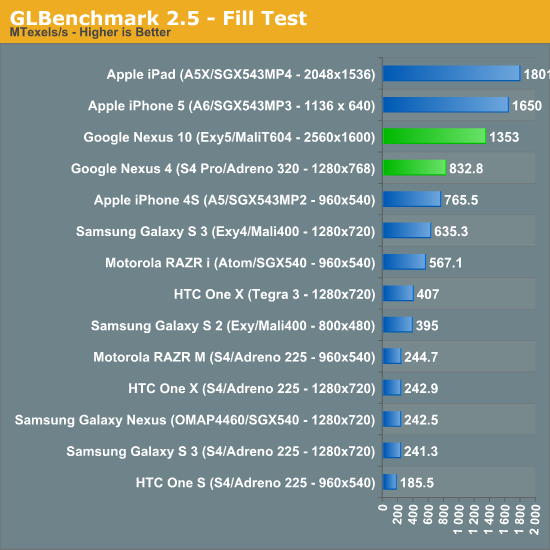
As far as raw fillrates are concerned, both Nexus devices do quite well here at their native resolutions. The iPad and iPhone 5 are both quicker, but we're still good gains over the previous generation of hardware - particularly for the Mali-T604. Compared to the Mali-400MP4 in the Galaxy S 3, we're seeing more than 2x the performance out of ARM's latest GPU.
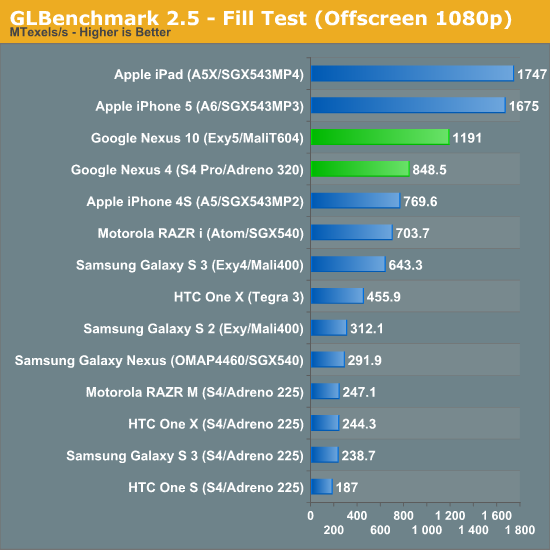
At normalized resolutions the standings don't really change.
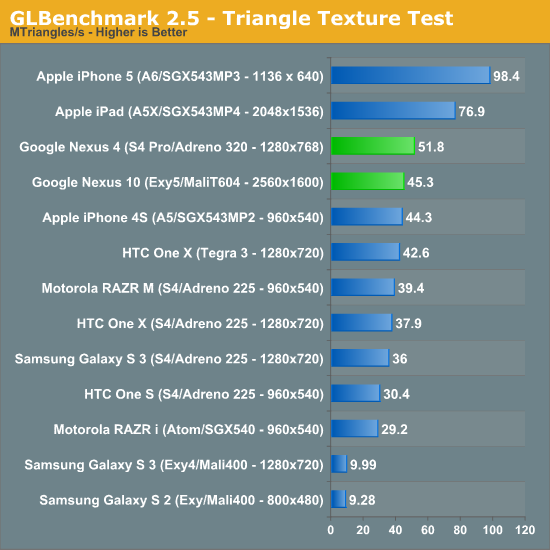
The T604 is ARM's first unified shader architecture, which gives it far more balanced pixel/vertex shader performance. The result is a more than 4x increase in triangle throughput compared to the Mali 400MP4. It's not enough to give the Nexus 10 the edge over the latest Apple devices, but it's a huge improvement over where ARM was in the previous generation. The Adreno 320 continues to be quite strong here as well.
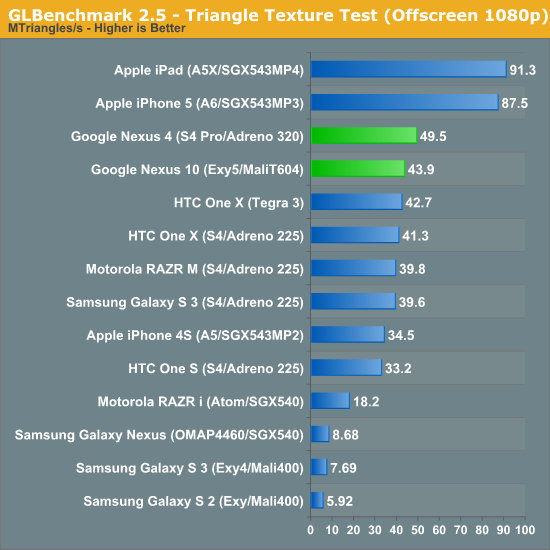
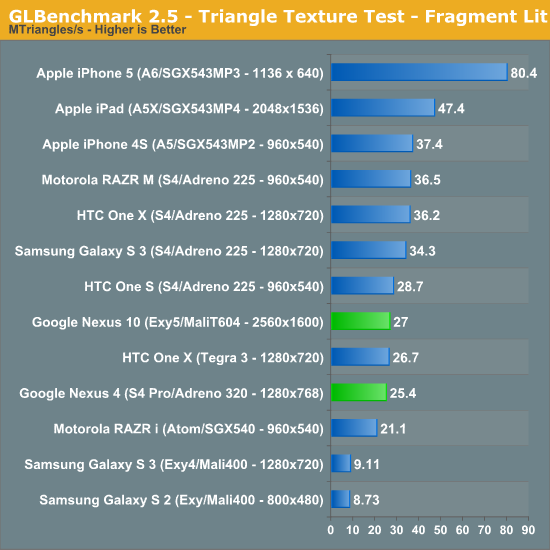
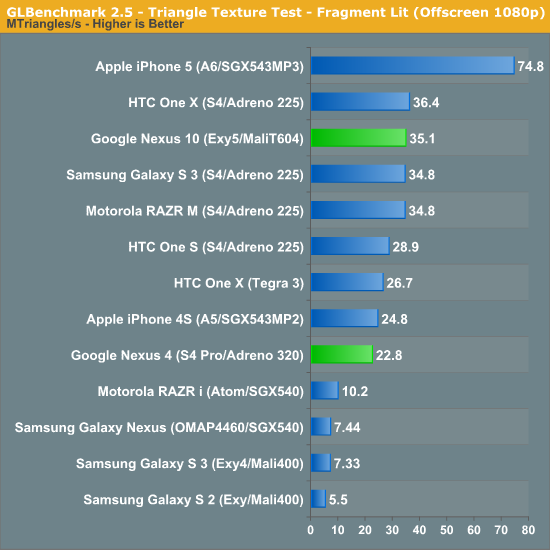
Once again we're seeing huge gains for the Mali-T604 compared to the Mali-400MP4. The Adreno 320 in the Nexus 4 actually performs worse than the Adreno 225 in older devices, possibly due to thermal throttling we saw on the Nexus 4 sample during periods of heavy load.
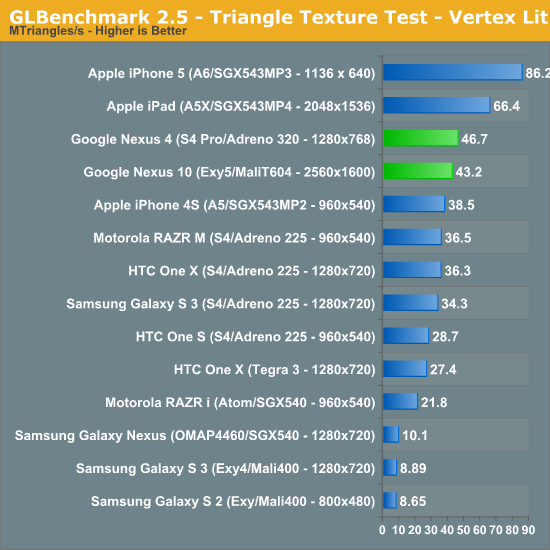
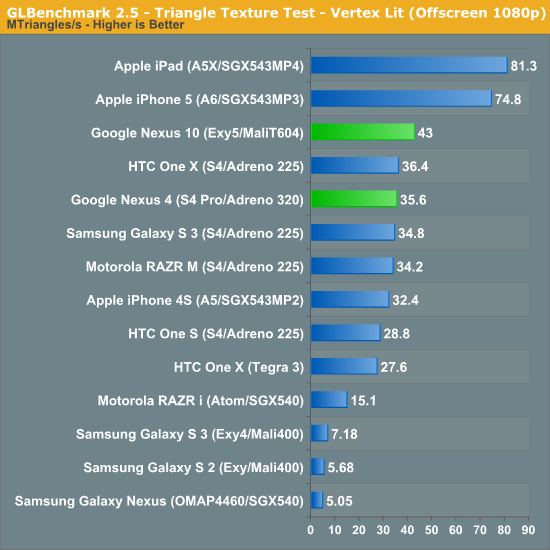
ARM shows the biggest gains here once again thanks to its move to a unified shader architecture. The Adreno 320 does ok here but it's really no better than the 225, I suspect there is some thermal throttling happening on the device.
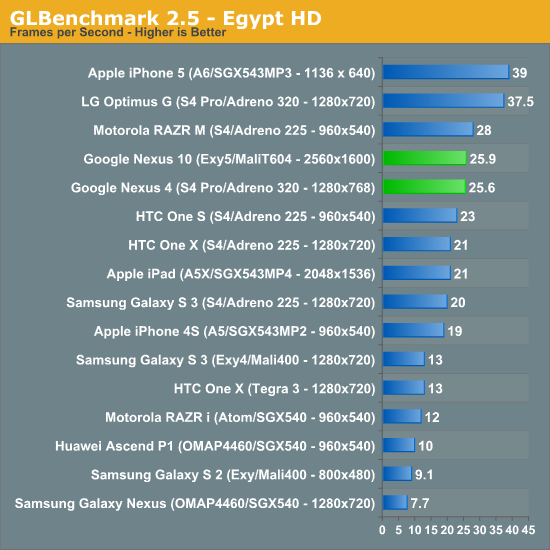
At native resolutions, the Nexus 10 and NExus 4 are both capable of putting out decent frame rates in Egypt HD. What this data tells us is they'll likely be able to run current and even some future titles, at native res, at 30 fps without much of an issue.
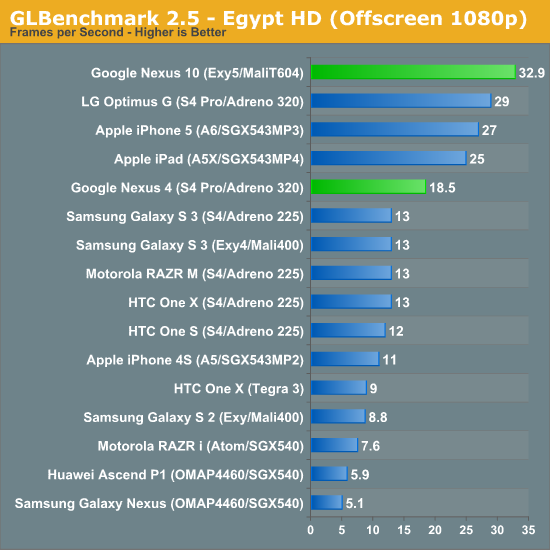
Normalize resolution and the Mali-T604 actually does very well here, setting a new performance record. Despite being based on the same hardware, the Optimus G is able to post a much higher score here than the Nexus 4. The explanation is simple: the Optimus G can't complete a single, continuous run of GLBenchmark 2.5 - the app will run out of texture memory and crash if you try to run through the entire suite in a single setting. The outcome is that the Optimus G avoids some otherwise nasty throttling. The Nexus 4 on the other hand manages to complete everything, but likely quickly throttles its clocks down due to thermal constraints. The Nexus 4 was really hot by the end of our GLBenchmark run, which does point to some thermal throttling going on here. I do wonder if the Snapdragon S4 Pro is a bit too much for a smartphone, and is better suited for a tablet at 28nm.
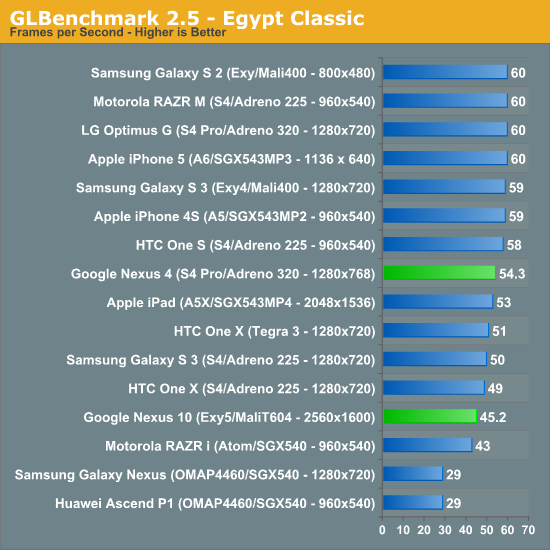
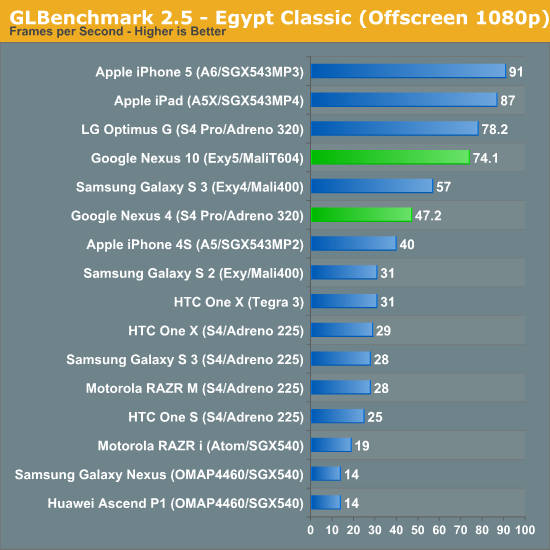
The Egypt Classic numbers are less interesting, but both platforms do well here.
Battery Life
We didn't have time to run through our entire battery life suite, but we do have some relevant results for the two devices. For smartphones, these are our latest web browsing battery life tests:
We regularly load web pages at a fixed interval until the battery dies (all displays are calibrated to 200 nits as always). The differences between this test and our previous one boil down to the amount of network activity and CPU load.
On the network side, we've done a lot more to prevent aggressive browser caching of our web pages. Some caching is important otherwise you end up with a baseband test, but it's clear what we had previously wasn't working. Brian made sure that despite the increased network load, the baseband still had the opportunity to enter its idle state during the course of the benchmark.
We also increased CPU workload along two vectors: we decreased pause time between web page loads and we shifted to full desktop web pages, some of which are very js heavy. The end result is a CPU usage profile that mimics constant, heavy usage beyond just web browsing. Everything you do on your smartphone ends up causing CPU usage peaks - opening applications, navigating around the OS and of course using apps themselves. Our 5th generation web browsing battery life test should map well to more types of smartphone usage, not just idle content consumption of data from web pages.
As always we test across multiple air interfaces (3G, 4G LTE, WiFi), but due to the increased network load we actually find that on a given process technology we see an increase in battery life on faster network connections. The why is quite simple to understand: the faster a page is able to fully render, the quicker all components can drive down to their idle power states.
All Android tests use Chrome and 5GHz WiFi unless otherwise listed.
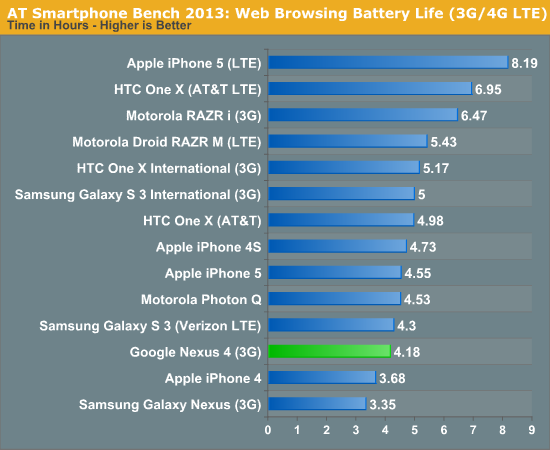
The Nexus 4 doesn't break any records for 3G battery life, it ends up relatively low on our list - even the Galaxy S 3 manages to do better here on 3G.
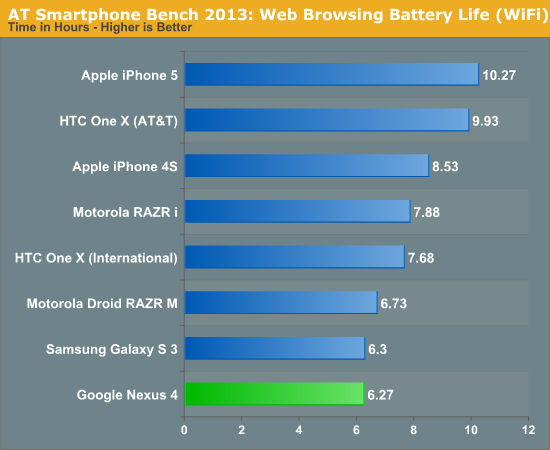
WiFi battery life is similar to the Galaxy S 3, but again it's not all that impressive compared to some of the other devices in this list.
Our tablet web browsing battery life test isn't directly comparable to the new smartphone tests, so we've got a separate chart for the Nexus 10:
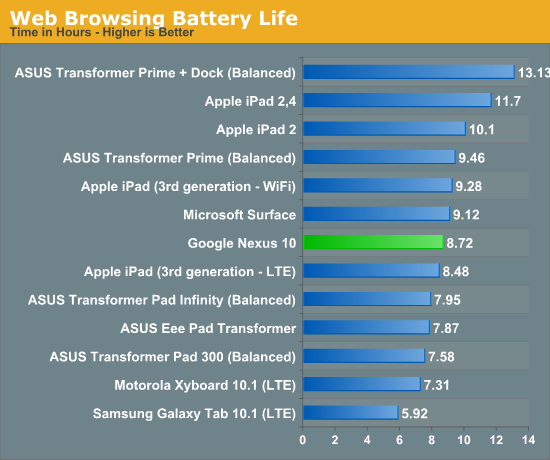
Despite driving a very high res panel, Google is able to deliver relatively competitive battery life with the Nexus 10. Battery capacity is around 80% the size of the 3rd gen iPad and battery life is around 93% of what Apple delivers here. Over 10 hours would be nice to have, but 8 hours of use in this test isn't bad at all. We'll have to do more testing to understand Exynos 5's power behavior a bit better, but so far it doesn't seem that the platform is all that bad from a power consumption standpoint. It remains to be seen how gracefully the Nexus 10 will handle being taxed heavier.
Display
We're still running our big display analysis routines on the new Nexus devices, but the brightness/contrast data below is a little teaser:
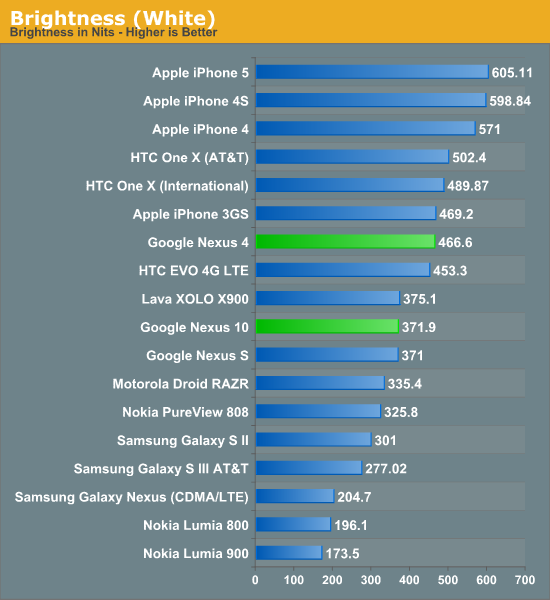
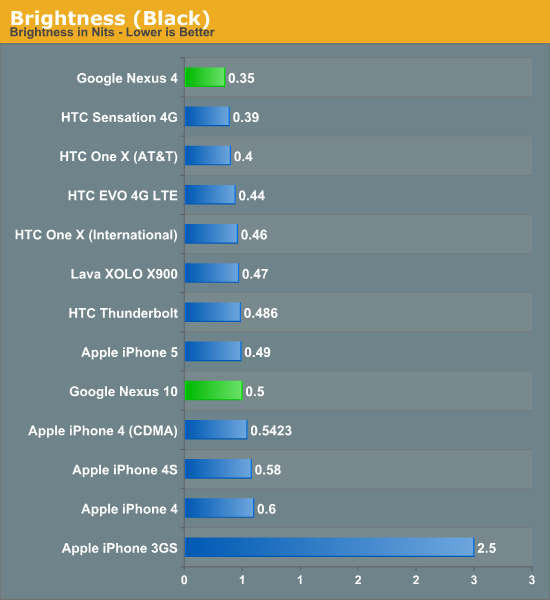
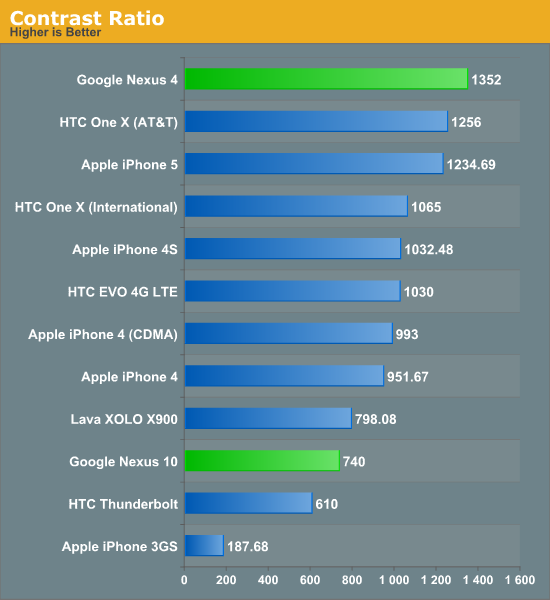
Final Words
We still have a lot of additional writing and testing ahead of us. Stay tuned for our full review of both devices!










244 Comments
View All Comments
cosminmcm - Friday, November 2, 2012 - link
Here:http://www.anandtech.com/show/6426/ipad-4-gpu-perf...
doobydoo - Friday, November 2, 2012 - link
'That's not quite true.The Exynos 5 according to this test is now king of the hill in the Egypt HD Offscreen test.'
Um, no.
There are lots of offscreen tests, two Egypt ones. The Exynos 5 powering a TABLET loses to the iPhone 5 (a smartphone) in all but one of the off screen tests, including an Egypt Classic Off-Screen test.
Then there's the iPad 4 which Apple claimed doubles graphics performance. It wont even be close.
Pipperox - Friday, November 2, 2012 - link
The Egypt tests are the only "game like" tests where an actual scene is being rendered.The others are synthetic tests which as I said have been long abandoned in the PC industry due to being meaningless, unreliable and prone to cheating (the older guys will certainly remember the early days of NVidia VS 3Dfx :)
Of the 2 Egypt tests, the "Classic" is representative of games and graphic complexity of 1-2 year ago, while the HD indicates what's coming next year.
And yes Exynos 5 is powering a tablet now, but will trickle into smartphones in the coming months, for sure will be in the SGS 4.
doobydoo - Saturday, November 3, 2012 - link
So firstly you believe that you know better than Anandtech and you can decide that you're only going to listen to the 1 out of 10 or so benchmarks in which the product you clearly support barely comes out on top.Then, you're going to claim that the same clock speed and performance will be found in smartphones, despite the atrocious battery life of this in tablet form.
And finally, you're just going to stick your fingers in your ears and shout 'la la la' because you didn't want to hear the fact that the already-out iPad will surpass this in performance by a long way.
You sound balanced.
Pipperox - Saturday, November 3, 2012 - link
First off: i do not support any product.Second: It's not that I didn't want to hear about the iPad 4 performance, i just hadn't seen any review out at the time i was writing. Now i did.
Third: you're free to believe whoever you want, but I do not need to believe to Anand, although i generally consider it a reputable site. As a computer engineer with enough specific knowledge on such matters, i believe i understand enough to form my own opinion.
Benchmarks for mobile phones and tablets are in the stone age.
Several "reputable" tech websites have been posting Quadrant scores for years to compare phones performance.
Should I believe those?
I've personally witnessed Quadrant scores being increased by factor 2.5x on the SAME DEVICE, with minor tweaks on a custom rom.
Tweaks which did not yield ANY tangible improvement in any other application.
Browser based benchmarks: well they're just that, BROWSER benchmarks.
On my device if I test 3 different browsers, i get Sunspider and Browsermark scores which range anything between 50% and 100% (the latter being the "fastest" browser).
Chrome is NOT the fastest browser, btw.
GLBenchmark: out of all those tests, only 2 actually render a game like scene. Those are Egypt HD and Classic. Then these are divide between "normal" and Offscreen scores.
Only Offscreen scores are run at the same resolution on all devices, so they're the only ones which can be used to compare GPU performance.
Bit IF you want to compare *per DEVICE* framerates, then off course resolution is relevant and you should look at the "on screen" scores.
Finally the other tests from GLBenchmark like Fillrate and Triangle throughput: when you want to buy a PC graphic card, do you base your purchase on 3DMark scores, or on a dozen GAMES average fps scores, games which the *reputable* tech sites update on a yearly basis?
The PC industry has moved on from synthetic benchmarks.. 10 to 15 years ago.
Before we had things like, NVidia's Riva 128 beating 3Dfx in synthetic benchmarks, and then people scratching their head when their games were not running as smoothly as on their friends' 3DFx.
Fourth: a quad core Snapdragon Pro, running more slowly than its dual core sibling (which has also a lesser GPU), and slower than its IDENTICAL TWIN sold under another name (LG), doesn't sound right to me and makes me think that there were issues during the test (either of HW, SW or methodology nature).
But you're free to believe what you want.
dyc4ha - Saturday, November 3, 2012 - link
+over 9000UpSpin - Saturday, November 3, 2012 - link
I hope others read this valuable post, too. Well said, great.doobydoo - Sunday, November 4, 2012 - link
'First off: i do not support any product.'Easy to claim. Your comment suggests otherwise.
'Second: It's not that I didn't want to hear about the iPad 4 performance, i just hadn't seen any review out at the time i was writing. Now i did.'
But we knew it would represent a significant increase over the iPad 3 (based on Apples 2x performance claim) which only lost out to a tablet you claimed is the undisputed king of tablet performance by a small margin in 1 of 10 tests.
'Benchmarks for mobile phones and tablets are in the stone age.
Several "reputable" tech websites have been posting Quadrant scores for years to compare phones performance.
Should I believe those?'
If they post Quadrant scores, they aren't reputable.
GL benchmarks are different, and a great indicator.
'Browser based benchmarks: well they're just that, BROWSER benchmarks.
On my device if I test 3 different browsers, i get Sunspider and Browsermark scores which range anything between 50% and 100% (the latter being the "fastest" browser).
Chrome is NOT the fastest browser, btw.'
Nothing I said was about browser benchmarks. And take any of the browsers you like, they all come out slower than even the iPhone 5.
'GLBenchmark: out of all those tests, only 2 actually render a game like scene. Those are Egypt HD and Classic. Then these are divide between "normal" and Offscreen scores.
Only Offscreen scores are run at the same resolution on all devices, so they're the only ones which can be used to compare GPU performance.'
The reason there are different tests is that different games can put different demands on each aspect of the GPU, such as the Fill test. Thus, one single game running a 'game like scene' is not representative of all, and this is also why the other benchmarks are equally important.
' or on a dozen GAMES average fps scores, games which the *reputable* tech sites update on a yearly basis?'
Where do I see a dozen game FPS scores? And are the games at the same resolution and quality? FPS isn't the only measure of performance. Same FPS at higher quality is a better user experience.
'Before we had things like, NVidia's Riva 128 beating 3Dfx in synthetic benchmarks, and then people scratching their head when their games were not running as smoothly as on their friends' 3DFx.'
Talking about old benchmarks not being representative says nothing about newer benchmarks.
'Fourth: a quad core Snapdragon Pro, running more slowly than its dual core sibling (which has also a lesser GPU), and slower than its IDENTICAL TWIN sold under another name (LG), doesn't sound right to me and makes me think that there were issues during the test (either of HW, SW or methodology nature).'
And even the 'Identical twin' in the Chromebook is different again. So either you've got 2 defective devices there or my point is correct that just because they use the same architecture doesn't equal the same performance.
Pipperox - Sunday, November 4, 2012 - link
"But we knew it would represent a significant increase over the iPad 3 (based on Apples 2x performance claim) "So just because Apple claimed a 2x performance
increase, we should have blindly believed them?
Finally you show your bias...
(as for me, NOW THAT I'VE SEEN TESTS of the iPad 4, I have no problem calling it King of the Hill of GPU performance).
"If they post Quadrant scores, they aren't reputable.
GL benchmarks are different, and a great indicator."
Says who?
On what are you basing such claims?
A benchmark made by.. Kishonti Informatics, based in.. Budapest?
Who are they?
I could code an OpenGL benchmark as well.
It's not like it was a cross industry independent committee which developed such a benchmark, like, i don't know, the SPEC Consortium?
"The reason there are different tests is that different games can put different demands on each aspect of the GPU, such as the Fill test. Thus, one single game running a 'game like scene' is not representative of all, and this is also why the other benchmarks are equally important."
NO, if you knew how one of such tests was implemented, or had any idea of how to write one, you'd know that such synthetic benchmarks stress ONE SINGLE aspect in isolation, creating totally unrealistic conditions.
For example, fill rate tests have an incredibly low number of polygons, and poly throughput tests have 1 pixel large triangles.
And none use complex shaders.
One architecture can do great in synthetic tests, but for example not having enough bandwidth for keeping up with the same performance once you turn on all the bells and whistles.
This has been proven over and over again in the past, and it is proven here by the Egypt scene.
And mind you, i'm not even advocating the Egypt benchmark to be reliable, it's just a little bit less unrealistic and meaningless as the others.
"Where do I see a dozen game FPS scores? And are the games at the same resolution and quality? FPS isn't the only measure of performance. Same FPS at higher quality is a better user experience."
Open any PC graphic card review on Anandtech or reputable competing sites.
And yes FPS is not the only measure of perfomance, but since you cannot change quality settings on mobile phone games, the quality argument doesn't hold candle here.
"And even the 'Identical twin' in the Chromebook is different again. So either you've got 2 defective devices there or my point is correct that just because they use the same architecture doesn't equal the same performance. "
The Chromebook runs a DIFFERENT OS!
And a different SW stack!
That makes the difference!
But the LG Optimus G and the Google Nexus 4 ARE THE SAME PHONE on the SAME OS!
With the difference of phone storage size and SD Card slot.
And minor SW customizations.
There is no point about "same architecture", here we're talking about the exact same CPU!
So if the Google Nexus 4 can't complete any benchmark without clock throttling, you cannot post numbers scored while throttling, it doesn't make any sense!
And does numbers will never be repeatable, depending on current temperature of the room, battery status, previously run sw, etc!
If a device cannot complete a single run of a 3 minute benchmark without thermal throttling, that device is defective!
So either you got a lemon, and then you should return it to the manufacturer or do further investigation.
Or that device has a major manufacturing flaw, it should be announced and do everything so that it is recalled.
Because nobody should buy a device which cannot run a 3min benchmark without throttling.
De_Com - Monday, November 5, 2012 - link
Excellent Post Pipper !!Very informative and very well detailed.
Nice to see someone not just taking the benchmarks as the be all and end all of a device choice.